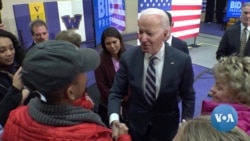There's a last-minute scramble for support ahead of Monday's Iowa's Democratic presidential caucus -- the first big test of voter preference in the November election.
It's a crowded field with 11 contenders all hoping to be the Democrats' choice to stop U.S. President Donald Trump’s re-election in November.
Polls going into Monday’s caucus show Senator Bernie Sanders and former Vice President Joe Biden neck-and-neck with Senator Elizabeth Warren and former South Bend, Indiana Mayor Pete Buttigieg close behind.
But many caucus-goers have said they are still undecided and analysts say a few surprises are possible.
Unlike primary elections, where actual ballots are cast, voters participate in caucuses by gathering in meetings at schoolhouses, town halls, empty stores, and even people's homes.
They show their preferences by raising their hands or huddling in groups of supporters.
WATCH: Related video by VOA's Kane Farabaugh
Backers of any candidate who fails to get at least 15% of the vote are given a chance to throw their support behind another candidate before a final statewide count is made and a winner declared.
Despite all the attention it gets, the Iowa caucus has not always been a reliable harbinger of who will win the Democratic Party nomination.
Bill Clinton had a notoriously poor showing in the 1992 caucus with less than 3% support and wound up winning the White House that November.
Texas Senator Ted Cruz won the 2016 Republican caucus, but Trump was the nominee.
Former Iowa Governor Tom Vilsack says Iowans believe the purpose of the caucus is to narrow the large field of candidates so the rest of the country has few choices but good choices for the primaries.







